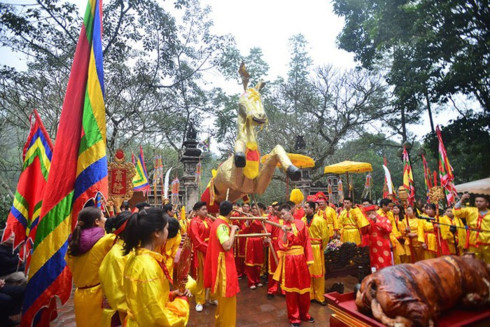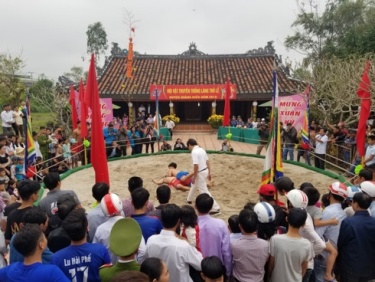
An estimated 50,000 pilgrims flocked to Huong or Perfume pagoda in Hanoi on February 10, the first day of Vietnam’s longest festival. To reach the main pagoda, visitors must take a one-hour boat trip on the Yen stream.
“We have 4,000 boats and are committed to ensuring maximum transport safety. All food service providers have signed commitments on food safety,” said Nguyễn Văn Hoạt, Chief administrator of My Duc district, which hosts the Perfume pagoda festival.

The horse procession at the Soc temple festival.
The Perfume pagoda is a vast and striking complex of pagodas and Buddhist shrines built into the karts cliffs of Huong Tich Mountain (Mountain of the Fragrant Traces). The 3-month long Perfume pagoda festival drew 1,5 million visitors last year.
The same day, the Soc temple festival took place in Hanoi to honor the mythical hero, god and saint, Thanh Giong, who is credited with defending the country from the Chinese invaders, and is worshipped as the patron god of the harvest, national peace and family prosperity.
The festival re-enacted Saint Giong’s feats through the riding of a white horse into battle and the orchestration of an elaborate flag dance to symbolize the battle itself. The celebrations at Soc temple, where Saint Giong ascended to heaven, included the ritual of bathing his statue and a procession of bamboo flowers to the temple as offerings to the Saint.

February 10 also witnessed a traditional wrestling competition in Thu Le village in the central province of Thua Thien-Hue. The annual festival was first held 200 years ago in order to select healthy men for the army of the Nguyen dynasty which reigned Vietnam from 1802 to 1945. The bout also aims to encourage physical training among local young men.
The northern province of Bac Giang on February 10 celebrated 592 years of the Xuong Giang victory against the Chinese Ming invaders.
After a 6-month battle in 1427, Vietnamese troops under the leadership of General Trần Nguyên Hãn defeated the Ming aggressors at Xuong Giang citadel, contributing to ending the Ming dynasty’s 20-year rule in Vietnam.
Source: vov.vn




